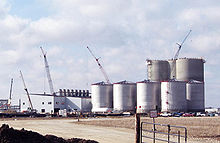|
Food vs. fuel is the dilemma regarding the risk of diverting farmland or crops for biofuels production in detriment of the food supply on a global scale. The "food vs. fuel" or "food or fuel" debate is international in scope, with good and valid arguments on all sides of this issue. There is disagreement about how significant the issue is, what is causing it, and what can or should be done about it. Biofuel production has increased in recent years. Some commodities like maize, sugar cane or vegetable oil can be used either as food, feed or to make biofuels. For example, since 2006, land that was also formerly used to grow other crops in the United States is now used to grow maize for biofuels, and a larger share of maize is destined to ethanol production, reaching 25% in 2007. Since converting the entire grain harvest of the US would only produce 16% of its auto fuel needs, some experts believe that placing energy markets in competition with food markets for scarce arable land will inevitably result in higher food prices. A lot of R&D efforts are currently being put into the production of second generation biofuels from non-food crops, crop residues and waste. Second generation biofuels could hence potentially combine farming for food and fuel and moreover, electricity could be generated simultaneously, which could be beneficial for developing countries and rural areas in developed countries. With global demand for biofuels on the increase due to the oil price increases taking place since 2003 and the desire to reduce oil dependency as well as reduce GHG emissions from transportation, there is also fear of the potential destruction of natural habitats by being converted into farmland. Environmental groups have raised concerns about this trade-off for several years, but now the debate reached a global scale due to the 2007–2008 world food price crisis. On the other hand, several studies do show that biofuel production can be significantly increased without increased acreage. Therefore stating that the crisis in hand relies on the food scarcity. Brazil has been considered to have the world’s first sustainable biofuels economy and its government claims Brazil’s sugar cane based ethanol industry has not contributed to the 2008 food crisis. A World Bank policy research working paper released in July 2008 concluded that "...large increases in biofuels production in the United States and Europe are the main reason behind the steep rise in global food prices", and also stated that "Brazil’s sugar-based ethanol did not push food prices appreciably higher". However, a 2010 study also by the World Bank concluded that their previous study may have overestimated the contribution of biofuel production, as "the effect of biofuels on food prices has not been as large as originally thought, but that the use of commodities by financial investors (the so-called â€Âfinancialisation of commoditiesâ€Â) may have been partly responsible for the 2007/08 spike." A 2008 independent study by OECD also found that the impact of biofuels on food prices are much smaller 
Ethanol fuel plant under construction, Butler County, Iowa
From Wikipedia, the free encyclopedia : Market Trade in non-food items (no textiles, clothing and footwear) |


